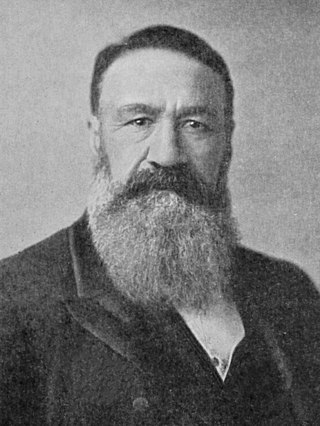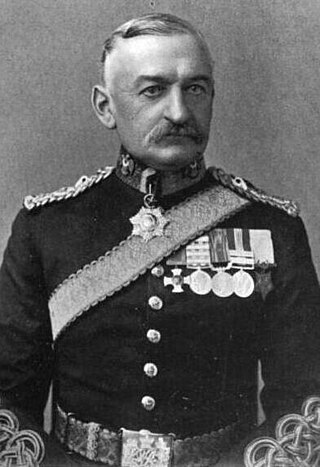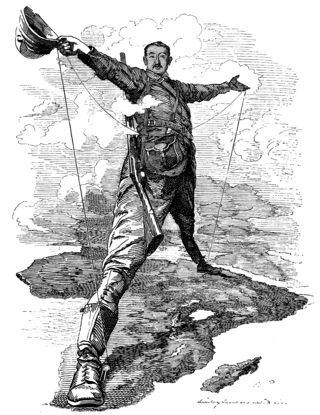| |||||||||||||||||
| |||||||||||||||||
| |||||||||||||||||
Presidential elections were held in the South African Republic between 3 January and 4 February 1898. [1] The result was a victory for incumbent Paul Kruger. [2] [3]
| |||||||||||||||||
| |||||||||||||||||
| |||||||||||||||||
Presidential elections were held in the South African Republic between 3 January and 4 February 1898. [1] The result was a victory for incumbent Paul Kruger. [2] [3]
The incumbent president Paul Kruger was involved in a constitutional battle with Chief Justice John Gilbert Kotzé. After trying to unsuccessfully remove Kotzé though legislation, he waited until after the election to dismiss him. [4]
Kruger ran for re-election alongside two challengers.
A distinguished member of the Volksraad and commandant of the Lydenburg Commando, Schalk Willem Burger was popular with the British and the capitalists of Johannesburg. [5] This was due to the South African Industrial Report of 1897, produced by a committee under his leadership, which called for the lowering of tariffs, among other suggestions. [6] Despite the conclusions of the report, Burger was an ardent patriot; however, the conclusions of the report and support from anti-ZAR newspapers led some voters to distrust him. [5]
Vice-President and Commandant-General Piet Joubert had previously run against Kruger three times without success. [7] [2] He had narrowly lost against him in 1893, losing by around 900 votes, with allegations of electoral manipulation in favour of Kruger and reports of voter turnout being greater than 100%. [8]
Claims were made that former Cape Colony Prime Minister Cecil Rhodes colluded against Kruger during the election campaign. [9]
| Candidate | Votes | % |
|---|---|---|
| Paul Kruger | 12,858 | 69.08 |
| Schalk Willem Burger | 3,753 | 20.16 |
| Piet Joubert | 2,001 | 10.75 |
| Total | 18,612 | 100.00 |
| Source: Annual Register [1] | ||
After his re-election Kruger removed Kotzé from office. [4]

The South African Republic, also known as the Transvaal Republic, was an independent Boer republic in Southern Africa which existed from 1852 to 1902, when it was annexed into the British Empire as a result of the Second Boer War.

The Jameson Raid was a botched raid against the South African Republic carried out by British colonial administrator Leander Starr Jameson, under the employment of Cecil Rhodes. It involved 500 British South Africa Company police launched from Rhodesia over the New Year weekend of 1895–96. Paul Kruger, for whom Rhodes had great personal hatred, was president of the South African Republic at the time. The raid was intended to trigger an uprising by the primarily British expatriate workers in the Transvaal but it failed. The workers were referred to as The Johannesburg Conspirators. They were expected to recruit an army and prepare for an insurrection; however, the raid was ineffective, and no uprising took place. The results included embarrassment of the British government; the replacement of Cecil Rhodes as prime minister of the Cape Colony; and the strengthening of Boer dominance of the Transvaal and its gold mines. The raid was a contributory cause of the Anglo-Boer War (1899–1902).

Stephanus Johannes Paulus Kruger was a South African politician. He was one of the dominant political and military figures in 19th-century South Africa, and State President of the South African Republic from 1883 to 1900. Nicknamed Oom Paul, he came to international prominence as the face of the Boer cause—that of the Transvaal and its neighbour the Orange Free State—against Britain during the Second Boer War of 1899–1902. He has been called a personification of Afrikanerdom, and remains a controversial figure; admirers venerate him as a tragic folk hero.

Cecil John Rhodes was a British mining magnate and politician in southern Africa who served as Prime Minister of the Cape Colony from 1890 to 1896. He and his British South Africa Company founded the southern African territory of Rhodesia, which the company named after him in 1895. He also devoted much effort to realising his vision of a Cape to Cairo Railway through British territory. Rhodes set up the Rhodes Scholarship, which is funded by his estate.

Hercules George Robert Robinson, 1st Baron Rosmead,, was a British colonial administrator who became the 5th Governor of Hong Kong and subsequently, the 14th Governor of New South Wales, the first Governor of Fiji, and the 8th Governor of New Zealand. From June 1859 until August 1896, he was known as Sir Hercules Robinson.

The Republic of Stellaland was, from 1882 to 1883, a Boer republic located in an area of British Bechuanaland, west of the Transvaal. After unification with the neighbouring State of Goshen, it became the United States of Stellaland from 1883 to 1885.

Petrus Jacobus Joubert, better known as Piet Joubert, was Commandant-General of the South African Republic from 1880 to 1900. He also served as Vice-President to Paul Kruger from May 1883 to October 1884 and from May 1896 until his death. He served in First Boer War, Second Boer War, and the Malaboch War.

Field Marshal Jan Christian Smuts, OM, CH, ED, KC, FRS was a prominent South African and Commonwealth statesman, military leader, and philosopher. He served as a Boer General during the Boer War, a British General during the First World War and was appointed Field Marshal by King George VI during the Second World War. In addition to various cabinet appointments, he served as Prime Minister of the Union of South Africa from 1919 until 1924 and from 1939 until 1948. From 1917 to 1919 he was one of five members of the British War Cabinet, helping to create the Royal Air Force. He played a leading part in the post-war settlements at the end of both world wars, making significant contributions towards the creation of the League of Nations and the United Nations. He did much to redefine the relationship between Britain and the Dominions and Colonies, leading to the formation of the British Commonwealth.
The coins of the South African pound were part of the physical form of South Africa's historical currency, the South African pound. Prior to the Union of 1910, various authorities issued their own pounds, some as independent entities. After the Union but before 1923, coins in circulation were mostly British, but the coins of Paul Kruger's South African Republic remained in circulation. In 1923, South Africa began to issue its own coins, adopting coins that were identical in size and value to those used in Great Britain: 12 pence (12d) = 1 shilling (1s), and 20s = 1 pound (£1). On 14 February 1961, the Union of South Africa adopted a decimal currency, replacing the pound with the Rand.
The British South Africa Company appointed a variety of officials to govern Southern Rhodesia between 1890 and 1923. The most prominent of these were the Administrator and the Chief Magistrate, the first of which was in effect the head of government during this time. As such, he held a seat on the Legislative Council of Southern Rhodesia ex officio.

Sir John Gilbert Kotzé KC was an eminent South African jurist.
Paul Roos Gymnasium is a public, dual medium high school for boys in the town of Stellenbosch in the Western Cape province of South Africa, which opened on 1 March 1866 as Stellenbosch Gymnasium. It is the 12th oldest school in the country.

Colonel Francis William Rhodes was a British military officer. He is perhaps the best known member of the Rhodes family after his mining magnate brother Cecil.

Schalk Willem Burger was a South African military leader, lawyer, politician, and statesman who was acting president of the South African Republic from 1900 to 1902, whilst Paul Kruger was in exile. At the age of 21, Burger worked as a clerk in the office of the field coronet. He married his wife, Alida Claudina de Villiers during this time.

Rhodes of Africa is a 1936 British biographical film charting the life of Cecil Rhodes. It was directed by Berthold Viertel and starred Walter Huston, Oskar Homolka, Basil Sydney, and Bernard Lee.

The Transvaal Civil War was a series of skirmishes during the early 1860s in the South African Republic, or Transvaal, in the area now comprising the Gauteng, Limpopo, Mpumalanga, and North West provinces of South Africa. It began after the British government had recognised trekkers living in the Transvaal as independent in 1854. The Boers divided into numerous political factions. The war ended in 1864, when an armistice treaty was signed under a karee tree south of the site of the later town of Brits.

Ohm Krüger is a 1941 German biographical film directed by Hans Steinhoff and starring Emil Jannings, Lucie Höflich, and Werner Hinz. It was one of a series of major propaganda films produced in Nazi Germany attacking the United Kingdom. The film depicts the life of the South African politician Paul Kruger and his eventual defeat by the British during the Boer War.
Presidential elections were held in the South African Republic in 1893. The result was a victory for Paul Kruger, although there were concerns that agents of Kruger had manipulated the electoral roll.
Carl (Karl) Ludwig Ferdinand Borckenhagen was an influential journalist and political leader of the Orange Free State, and a founder of the Afrikaner Bond.

Lucas Johannes Meyer, was a Boer general, member of the Transvaal government and president of the Nieuwe Republiek.